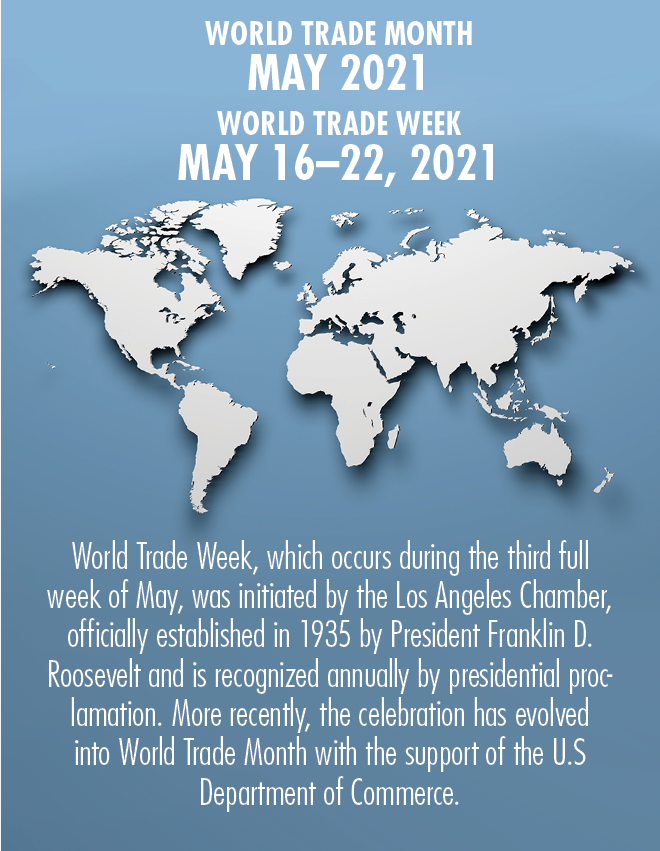 After a year of global uncertainty, international trade continues to be in the spotlight and its importance is once again being highlighted this month as we celebrate World Trade Month.
After a year of global uncertainty, international trade continues to be in the spotlight and its importance is once again being highlighted this month as we celebrate World Trade Month.
The economic advances that international commerce makes possible are clear, despite the regular attacks, and World Trade Month activities each May appropriately provide many opportunities to acknowledge the importance of global trade to the economies of California and the United States.
COVID Challenges
This year’s world trade festivities bring more clarity to the full scope of challenges the world experienced during the height of the COVID-19 pandemic in 2020, as many observers analyze where the pandemic leaves international trade for the future.
The world is still dealing with side effects from the initial shock of the pandemic, including supply chain disruptions around the world and port congestion. California ports, among the world’s busiest, are facing shipment delays, a scarcity of shipping containers, and high shipping rates.
The good news is that consumer demand is on the rise once again. In March 2021, the World Trade Organization (WTO) predicted a quick recovery in world trade as merchandise trade expanded more rapidly than expected in the second half of 2020.
The WTO predicts the volume of world merchandise trade will increase by 8% in 2021, after having fallen 5.3% in 2020. Trade growth will then slow to 4% in 2022, which would leave it below the pre-pandemic trend, according to the WTO. The WTO also sees an uneven economic recovery for global trade as the outlook is threatened by regional disparities, sustained weakness in services trade, and lagging vaccination timetables.
Maintaining and improving worldwide free trade remains critical given that most companies which export have an easier time riding out fluctuations in the U.S. economy and are more likely to stay in business.
California Trade Connections
California’s diverse economy relies heavily on exports and imports of both goods and services by California-based companies. The trade network is complex and interconnected, involving exports and imports through California’s transportation gateways, as well as inflows and outflows of human and capital resources.
The statistics underscore the importance of our international connections. In 2020, California exported $156.1 billion to 227 foreign economies, a decrease from $173.3 billion in 2019 due to the COVID-19 pandemic, according to the U.S. Department of Commerce.
California’s top export markets are Mexico, Canada, China, Japan and South Korea. Even with the decrease, California maintained its perennial position as a top exporting state, accounting for 10.29% of total U.S. exports.
Trade a Long-Standing Priority
With trade being a top-tier national issue, the California Chamber of Commerce continues to communicate its international trade priorities to secure a national free trade agenda.
Such an agenda is in keeping with the CalChamber’s long-standing support of expanding international trade and investment, fair and equitable market access for California products abroad, and eliminating disincentives that impede the international competitiveness of California business.
About a third of CalChamber members are engaged in international commerce, and more than two-thirds are small or medium-sized enterprises.
2021 Trade Priorities
Specifically, the CalChamber is focused on the following issues:
• Revamp the World Trade Organization (WTO) to ensure our trading partners adhere to fair and transparent trade practices, while being held accountable if they violate international rules.
The WTO is the only global international organization dealing with the rules of trade between nations. Its main function is to ensure that trade flows as smoothly, predictably and freely as possible. At its heart are the WTO agreements, negotiated and signed by the bulk of the world’s trading nations, and ratified or approved in their parliaments or legislatures. The goal is to help producers of goods and services, exporters and importers conduct business.
With a new WTO administration, the European Union and other major nations have come together to push for reforming and revamping the organization. Countries have supported the United States’ drive for greater transparency and discipline within the WTO, but also have stated it is important to uphold the global commercial order under growing tensions, not dismantle it.
The CalChamber is hopeful the major trading economies can reach consensus on a path forward for the WTO in 2021. The revamp should address the functioning of the Appellate Body, encourage greater transparency and enhance discipline for members who fall behind on reporting obligations.
• Lower tariffs and nontariff barriers to support expansion of U.S. exports as a long-term goal. Raising tariffs results in higher prices to the consumer for the specific product protected and in limited choices of products for consumers. Further, they cause a net loss of jobs in related industries, retaliation by U.S. and California trading partners, and violate the spirit of our trade agreements.
To be clear, the CalChamber supports efforts to ensure our trading partners adhere to fair and transparent trade practices and are held accountable when they violate international rules.
Further, the CalChamber supports reducing and eventually eliminating nontariff barriers, whether those obstacles are due to sanitary or phytosanitary certificates, lack of streamlined regulatory procedures, quotas, embargos, assessments, and similar monetary and other challenges imposed to limit imports into a country.
• Renew Trade Promotion Authority, which expires July 1, 2021, to enable the United States to easily pursue new trade deals. Trade promotion authority (formerly called fast track trade negotiating authority) is the process by which Congress gives authority to the President and/or U.S. Trade Representative to enter into trade negotiations in order to lower U.S. export barriers.
Traditionally, trade promotion authority follows the conclusion of negotiations for a trade agreement; enabling legislation is submitted to Congress for approval. Every president since Franklin D. Roosevelt has been granted the authority to negotiate market-opening trade agreements in consultation with Congress.
Major U.S. trading partners are participating in numerous agreements, and trade promotion authority is a prerequisite to meaningful U.S. participation.
Without trade promotion authority, the United States will be compelled to sit on the sidelines while other countries negotiate numerous preferential trade agreements that put U.S. companies at a competitive disadvantage. Trade promotion authority not only opens markets and broadens opportunities for U.S. goods and firms; it will make the United States the leader in global trade.
• Advance bilateral, regional and multilateral trade agreements which are critical to consumers, workers, businesses, farmers and ranchers.
By approving trade promotion authority, Congress can help strategically address the range of U.S. trade negotiations being pursued: conclusion to a U.S.-United Kingdom free trade agreement; a possible U.S.-European Union free trade agreement, conclusion to a U.S.-Kenya free trade agreement; and even a possible U.S. re-admission to the Trans Pacific Partnership (TPP) — now Comprehensive and Progressive Agreement for Trans-Pacific Partnership (CPTPP) — as well as other future trade negotiations.
The United States is among the world’s leading exporters due to increased market access achieved through trade agreements. Trade promotion authority is vital for the President of the United States to negotiate new multilateral, bilateral and sectoral agreements that will continue to tear down barriers to trade and investment, expand markets for U.S. farmers and businesses, and create higher-skilled, higher-paying jobs for U.S. workers.
Susanne T. Stirling is vice president of international affairs for the California Chamber of Commerce, www.calchamber.com/international.


